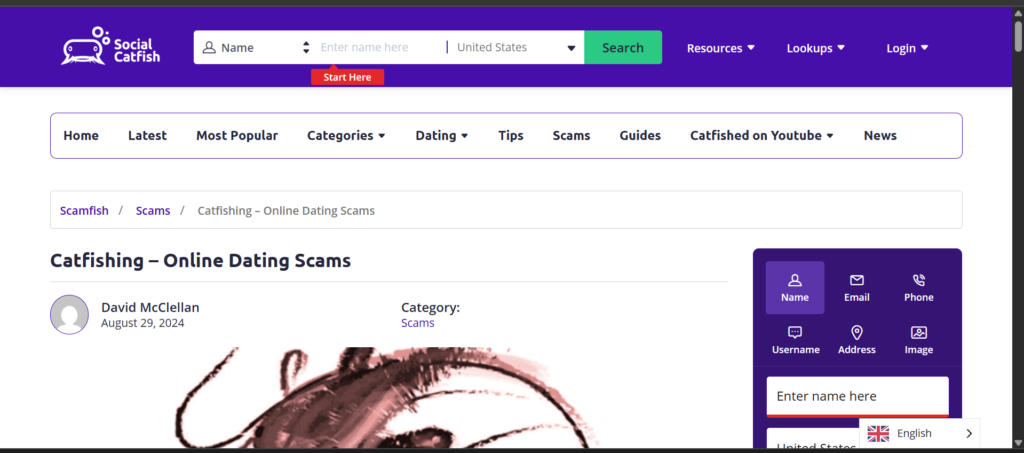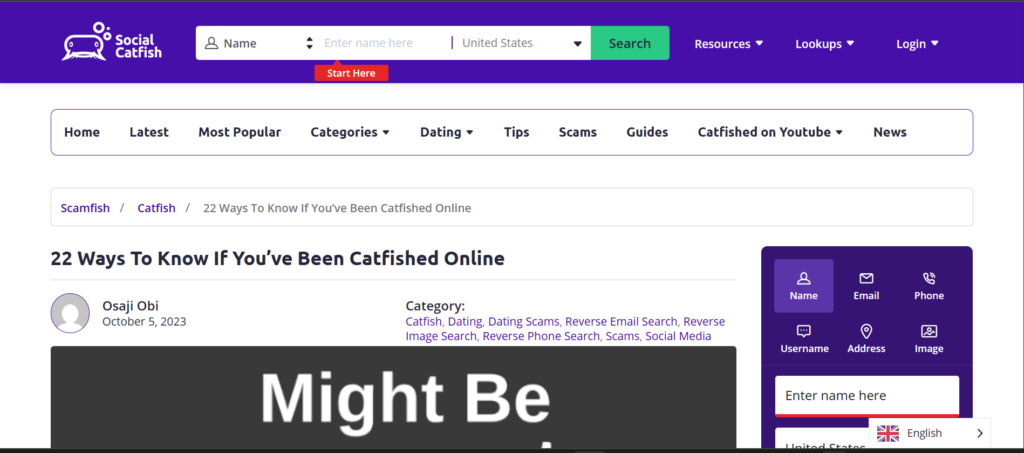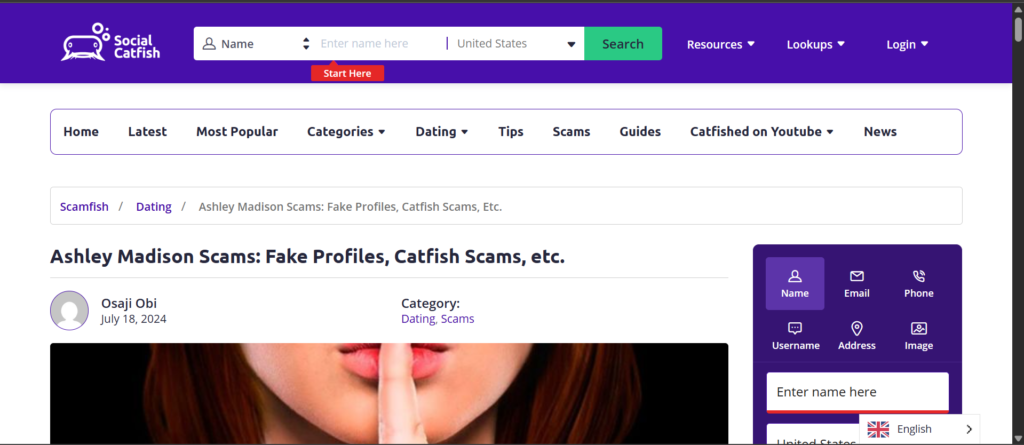Introduction
In today’s digital age, online dating has become a popular way to meet new people—but it also opens the door to a growing number of scams. One of the most common and dangerous schemes is catfishing—where scammers create fake identities to deceive and manipulate others, often for money or emotional control. Originally brought into the spotlight by Nev Schulman in the documentary Catfish, this form of fraud has become alarmingly common, with data suggesting that as many as 1 in 10 dating profiles are fake.
That’s where SocialCatfish.com comes in. As a trusted verification service, Social Catfish helps users uncover the truth behind online identities. Whether you’re concerned about a suspicious online relationship or just want to make sure the person you’re talking to is real, Social Catfish gives you the tools to verify photos, phone numbers, emails, social media profiles, and more—so you can date online with confidence.
By detecting red flags like fake profiles, stolen photos, or inconsistent stories, SocialCatfish.com empowers people to avoid emotional and financial harm from catfishing scams. It’s the smart way to stay safe and informed in the world of online connections.

What Is Catfishing in Online Dating?
Online dating has revolutionized how people meet and form relationships, but it also brings risks—one of the most deceptive being catfishing. SocialCatfish.com was created to help protect users from online scams by verifying identities and helping uncover catfish profiles. In this post, we’ll break down what catfishing is, why it happens, how to recognize it, and how to protect yourself.
What Is “Catfishing” in Online Dating?
Catfishing is a term used to describe a deceptive scam in which someone creates a fake identity online to trick another person into a relationship. Coined by Nev Schulman and his film crew in the documentary Catfish, the term gained widespread attention due to the increasing number of fake profiles on dating platforms.
Catfish scams have been around since the early days of online dating—going back as far as Love@AOL in the mid-1990s. Today, data suggests that 1 in 10 dating profiles are fake. These fake personas are often elaborate, with fake photos, backstories, and even supporting fake friends and contact information.
Why Are Online Dating Scammers Called “Catfish”?
The term “catfish” comes from a story told to Nev Schulman in the documentary. Fishermen once had trouble keeping cod fresh during long trips, so they supposedly added catfish to the tanks to keep the cod active. In a metaphorical sense, catfish keep people on their toes—but in the world of dating, they are deceitful individuals who emotionally manipulate others for personal gain.
Angela, who catfished Nev, was compared to the catfish in this story because she “stimulated” his emotions under false pretenses. While some may claim innocent intentions, most catfish have motives that are selfish, manipulative, and sometimes financially driven.
Common Signs of an Online Dating Scammer
Catfish scammers are skilled at creating emotional connections quickly. Here are warning signs that someone you’re speaking with online might be a scammer:
- They ask for money for emergencies, travel, or medical needs.
- They use fake profiles, often with stolen photos.
- They move too quickly, expressing love or commitment early.
- They avoid video chats or in-person meetings, citing travel or poor internet access.
- They provide inconsistent stories or contradictory personal details.
- They use poor grammar or spelling, hinting at language barriers or fake identities.
- They avoid answering direct questions, often deflecting or being vague.
Types of Catfish Scams
Different scams fall under the umbrella of catfishing, and each has its unique method:
1. Dating Catfish
These scammers use fake identities on dating sites like Facebook, OkCupid, or Plenty of Fish (POF.com). They may tell long, convincing stories and maintain relationships for months or even years.
2. Nigerian Prince Scam
A classic scam that started through mail and evolved into digital formats. The scammer poses as royalty or a wealthy figure needing your help (and money) to transfer funds.
3. Russian Bride Scam
A scam targeting lonely individuals where the catfish pretends to be a woman from Russia looking to marry. After a few weeks, they ask for money for travel, internet, or medical expenses—then disappear.
The Psychology Behind Catfishing
Why do people catfish? While some want financial gain, others have emotional motives:
- Loneliness: Some create fake profiles to feel less alone and form relationships they can’t sustain in real life.
- Sensation Seeking: These individuals take risks for emotional highs—legal or emotional.
- Extroversion: Many catfish enjoy attention and use fake personas to get it.
- Revenge: Some catfish people out of spite, targeting ex-partners or enemies.
- Greed: The most harmful kind, focused purely on extracting money and personal data.
How to Protect Yourself from Catfishing in Online Dating
Here are practical tips to stay safe:
- Use reverse image searches to verify profile photos.
- Ask for a video call early in the conversation.
- Be cautious of dramatic life stories or sudden emergencies.
- Avoid sending money or personal information to anyone online.
- Verify identities using tools like SocialCatfish.com, which helps confirm if someone is real.
Final Thoughts
Catfishing in online dating is a serious issue that affects thousands of people each year emotionally and financially. Scammers prey on trust and emotions, but you can protect yourself with awareness and tools like SocialCatfish.com. Whether you’re dating online or just meeting new people virtually, always verify before you trust.

22 Ways To Know If You’ve Been Catfished Online
What Is Catfishing Online?
Catfishing is a form of online deception where someone creates a fake identity—often using stolen photos and fabricated stories—to lure another person into an emotional or romantic relationship.
The term gained popularity through the 2010 documentary Catfish, which followed a man who fell in love with someone online, only to discover she wasn’t who she claimed to be.
The Harm It Causes
Catfishing isn’t just emotionally damaging—it can also lead to financial loss, identity theft, and deep personal betrayal. Victims often form genuine emotional bonds, only to realize the person behind the screen was never real.
22 Ways to Know If You’re Being Catfished
Be aware of the red flags. Here are 22 common signs that your online relationship might be a scam:
- They only have a few pictures on their profile, and none look recent.
- They may have many Facebook friends, but the interactions seem impersonal or distant.
- They claim not to know what Skype is, or they can’t download it, or always have tech issues preventing face-to-face calls.
- They text constantly but never call—even after weeks of conversation.
- They have no photos with friends—only selfies or posed images.
- None of their pictures are candid, natural, or in everyday settings.
- They seem too good to be true—appearance, job, lifestyle.
- They say they have a high-end job that doesn’t align with their age or background.
- They look like they could be a model or celebrity, but no proof backs it up.
- They don’t send you any new or personal photos—just reuse ones already on their profile.
- They say their computer doesn’t have a webcam, or the webcam never works.
- Their profile was recently created—suspiciously new and underdeveloped.
- They repeatedly cancel plans to meet up, often last-minute with excuses.
- Their profile is generic—no unique traits, hobbies, or details.
- They say, “I’m new to online dating and just trying it out.”
- They claim not to have a phone, or their voice doesn’t match their pictures (e.g., accent or tone).
- They ask you for money—for travel, emergencies, bills, or to “get home.”
- Their messages are full of spelling and grammar errors, even if they claim to be educated.
- They profess love or deep feelings early on, sometimes within days.
- They ask you to send money to someone else on their behalf, claiming they can’t receive it directly.
- They travel often for work, usually overseas, and frequently run into “money problems.”
- They have no social media accounts, or their stories about deleting them sound suspicious or over-explained.
What to Do If You Suspect You’re Being Catfished
If you recognize several of the red flags above, you might be the victim of catfishing. Here’s what you can do:
- Stop sending money immediately.
- Try a reverse image search of their profile photo to see if it appears elsewhere.
- Ask for a live video chat and verify their identity in real-time.
- Look for inconsistencies in their stories or answers.
- Use online tools like SocialCatfish.com to verify whether someone is who they claim to be.

How Ashley Madison Works
Ashley Madison allows married or attached individuals to engage in extramarital relationships, all under the promise of secrecy and discretion. The process is simple—create a profile, upload photos, pay to message others, and start flirting. But with anonymity comes vulnerability.
The platform is filled with potential matches, but many of them aren’t who they claim to be. From fake bots to real-life scammers, you could be chatting with anyone from a professional escort to a curious spouse playing detective.
How to Protect Your Ashley Madison Login Credentials
Before we get into scams, here’s how to secure your account and stay anonymous:
- Use a Strong and Unique Password
Never reuse passwords. Create a long, complex password using a mix of letters, numbers, and symbols. - Enable Two-Factor Authentication (2FA)
Always activate 2FA for an extra layer of protection—even if someone gets your password, they won’t get into your account easily. - Be Wary of Phishing Scams
Always double-check URLs. Never click suspicious links in emails. Hackers often create fake Ashley Madison login pages. - Keep Your Devices Updated
Outdated systems are a hacker’s playground. Regularly update your browser, OS, and antivirus software. - Use a VPN
Especially on public Wi-Fi. A VPN hides your browsing activity and IP address, keeping your identity and location secure.
How the Catfishing Scam Works with Ashley Madison
Scammers and catfishers create fake profiles using stolen photos, generic bios, and seductive messages. Once a connection is made, they often steer the conversation off-platform, send you to paid cam sites, or eventually ask for money. Sometimes, it’s not even about money—it could be about humiliation, exposure, or blackmail.
Why Is Catfishing on Ashley Madison So Dangerous?
Because Ashley Madison caters to married users seeking affairs, users are more likely to stay quiet and not report fraud. This creates the perfect breeding ground for scammers. Fear of exposure makes it easier for scammers to manipulate victims into paying hush money or continuing emotionally damaging conversations.
Getting Hooked by Ashley Madison?
Many users get sucked in by “guarantees” of affairs or refunded memberships. But those refunds often require you to receive a check in the mail, which defeats the purpose of discretion. Even worse, Ashley Madison’s messaging system is often filled with bots and escorts who pay to bait users into wasting credits or spending money off-platform.
What Do Ashley Madison Bots Do?
Bots are automated accounts that message users with pre-written flirty scripts. They encourage engagement, get you to spend credits, or send links to phishing or adult cam sites. You can spot them by:
- Repetitive, non-specific replies
- Over-the-top flattery
- Profiles created less than a week ago
- Refusing to meet or video chat
Ashley Madison Scammers
There are two types:
- Monetary Scammers – Pretend to be interested, then ask for money for emergencies, travel, or “sexy favors.”
- Harmless Catfishers – People hiding their identity for personal reasons (shyness, shame, etc.), but still deceiving.
Fake Profiles on Ashley Madison
Not all fake profiles are malicious. Some are created by users who want to stay anonymous or don’t match conventional beauty standards. However, many are professionally managed by escorts or even the site itself (to keep users engaged).
Signs That You’re Being Catfished on Ashley Madison
- They refuse to meet in person or video chat
- Their photos look too professional or generic
- They want you to visit an external link
- Their responses feel scripted or robotic
- They come on too strong, too fast
- They ask for money
- They’re located far away or in another country
- Their account is brand new or has few details
Ashley Madison Hack List
In July 2015, Ashley Madison suffered a massive data breach by a group called The Impact Team. Over 30 million user records were leaked, including names, emails, credit card data, and sexual preferences.
Key takeaways:
- Even deleted accounts were exposed
- Many users received blackmail threats
- Lawsuits followed due to Ashley Madison’s poor data protection
- It’s a warning for all online daters: nothing online is truly private
How to Avoid Being Catfished on Ashley Madison
- Do your research: Use reverse image searches, Google usernames, and check for red flags.
- Trust your gut: If something feels off, it probably is.
- Run a dating background check: A reverse image or username search can uncover stolen photos or fake profiles.
- Never send money: No matter how convincing the story is.
- Protect your anonymity: Use a VPN, create a unique email, and avoid sharing identifying info too soon.
Final Thoughts
Ashley Madison might promise discretion and excitement, but scammers promise heartbreak and financial loss. If you’re going to play, play smart. Protect yourself, use common sense, and don’t fall for too-good-to-be-true flirts. Because in the world of digital affairs, the price of deception can be far greater than just a broken heart.

